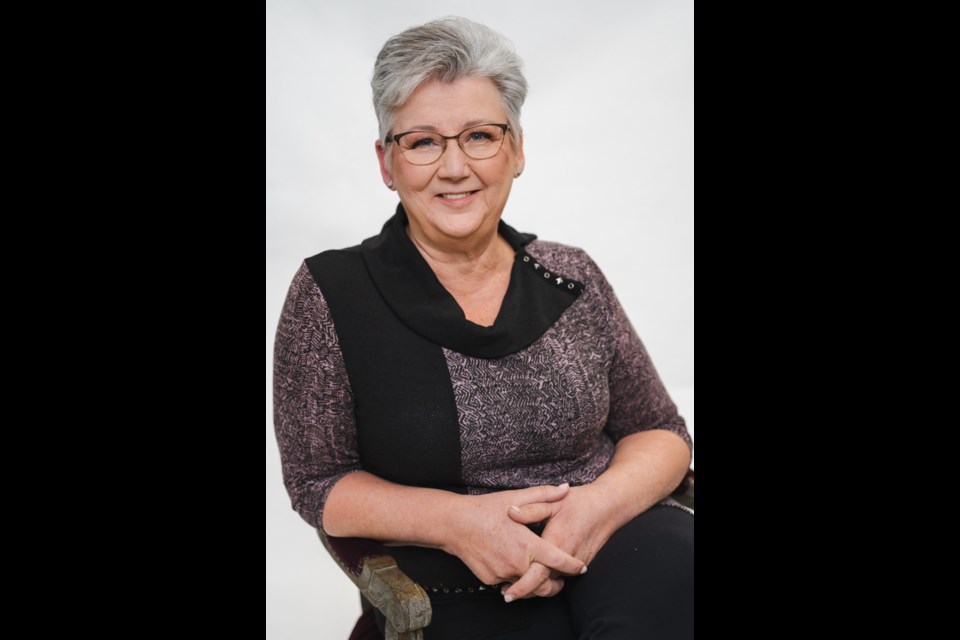Assiniboia - Like grace, the stroke was undeserved and unexpected. Julianne Heagy followed her usual routine on May 21st, 2019, before work. It was Julianne and her husband Blair’s 31st wedding anniversary and she looked forward to celebrating that evening.
Arriving at work, Julianne found several donation requests on her desk, but she couldn’t seem to focus on them. After a busy day of other priorities, she later returned to the donation requests. She could visualize the donations she wanted to gift but couldn’t find the words to write on the forms.
When one request required a phone call, she couldn’t even say her name. “I was so embarrassed,” she relates. “When the gal on the other end asked questions, all I could say was “Mmmm-hmmm”.
After that call, it was time to leave work for the day. She was feeling unwell and sent her daughter a text for a ride. Her message was garbled. Her daughter replied and asked if she was okay. Julianne responded, “Not sure.”
Her husband and daughter picked her up and took her to the local hospital where she was later transferred by ambulance to a city hospital. She was aware of the kindness of the paramedics and the doctors, but unable to speak. “It was like I was in a dark room. I wasn’t scared, but the words were like a wisp of smoke that I couldn’t get a hold of.”
Devastating loss defined Julianne’s life until she could get the help she needed. “I could only read for a couple minutes at a time and had almost entirely lost the ability to comprehend written words. As well, I would say things I didn’t mean to, hurtful things.
“My filters were no longer in place. This common symptom may explain why relationships and marriages seldom last 14 months after an acquired brain injury (ABI) or stroke.”
Frustration and anger became an everyday companion. “I was absolutely angry for a year. Then I learned that approximately 70 per cent of people struggle with anger following a brain injury. That fact helped me realize I wasn’t alone.”
“With my background in medical records and massage therapy, I knew there were resources for people like me, but I couldn’t think of the words, ‘heart and stroke.’ I couldn’t google the local Acquired Brain Injury Support Group because I couldn’t remember the title ‘Acquired Brain Injury.’ And even when I made medical appointments, I struggled to express my needs to the doctors if I had a fatiguing wait in the waiting room.”
In desperation, when Julianne would think of a word or phrase relating to the support she was looking for, she would write it on a post-it note and stick it to her bedroom wall.
“They were like the breadcrumbs that led me to find the help I needed.”
Julianne felt a deep loss of identity as well. “Statistically, only about 40 per cent of stroke victims return to work. When my job, and all the training and certifications that went with my previous careers were stripped away, “I realized how much ego I had surrounding what I did for a living. But then I had the opportunity to re-create myself. Actually, I had some fun with this. I asked myself, ‘What can I do now that I couldn’t do before?’”
Financial stability was a huge loss too, especially as Julianne and her husband were nearing retirement. “My insurance was going to run out at the one-year mark following my stroke. Before the stroke, I could figure out how to solve financial problems, but now I felt like I was free-falling and unable to work though to finding solutions.”
The losses pushed Julianne towards inner transformation. “The only way we made it out of the darkness surrounding Blair’s lung cancer diagnosis, surgery and chemo was to focus on an ‘attitude of gratitude.’ After my ‘angry year’, I knew I needed to return to gratitude. ‘Fake it till I make it,’ I told myself. I would start by being thankful for the simplest things - my blanket, anything!”
Julianne didn’t expect such deep loss, but her eyes have been opened to new possibilities. “Life will never return to normal. When you accept this and let go of your old life, then you can embrace your new life. When I was working, all I ever wanted to do was to spend time with Blair. And now, I’m there! When I realized I finally got what I’d always wanted, there was a huge shift within me. I’m so grateful now.”
As Juliane’s brain healed and she could start to work through her struggles, she gathered the trail of post-it notes stuck to her wall and turned it into a pathway of hope and healing for others.
She refers to her book as a tool for those who have experienced an acquired brain injury. It can also be for their friends and family, and even for caregivers.
“In December 2020, I was about 75 per cent finished the manuscript, but I had no idea how to edit it. Finally, I knew that if this book was meant to be, for it to help people, then I had to step back and let God step in. Shortly after, between an old friend with experience as an editor who volunteered to work on the book and a local publisher, Wood Dragon Books in Mossbank, the book came to be.”
Julianne believes this stroke happened for her, not to her; she views it as grace, an unexpected and undeserved gift to transform her grief into gratitude.
“A Stroke of Grace” is her gift to encourage and empower others like herself on the journey back to peace and joy.



